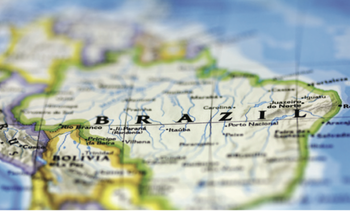
Long tagged as “the country of the future,” Brazil’s future has arrived, a number of pundits suggest, and Portuguese proficiency has become increasingly in demand.
Last year, Brazil overtook the United Kingdom as the world’s sixth largest economy. The nation, home to 154 million Portuguese language speakers, is also living large on the world stage by hosting the 2014 World Cup and 2016 Summer Olympics.
“It’s an enormous country that has been relatively invisible to Americans for a long time,” said Robert Davis, director of language instruction in the Department of Romance Languages. Davis has been instrumental in formalizing a new Portuguese language program at the UO.
“It takes several years to build a language program,” he said. “We don’t want to lag behind Brazil’s awakening.”
Since 2006 the UO’s World Languages Academy (WLA), a program affiliated with the Yamada Language Center, has been offering Portuguese. Over the past few years, these courses have attracted a steady increase in student interest, and now the Department of Romance Languages has decided to advance Portuguese to a higher-profile status.

While language classes offered through the WLA create opportunities to acquire language skills, the courses there don’t always count toward credit for a minor or major.
Now, as the fourth language in the Department of Romance Languages portfolio (along with Spanish, French and Italian), Portuguese will provide those wishing to study the language the benefit of greater breadth and depth of for-credit offerings. This fall, language instructor Simone Da Silva, who managed the Portuguese program at the WLA, will teach a course called Lusofonia: The Portuguese- Speaking World, the UO’s first-ever course exploring the culture and history of Portuguese-speaking communities around the world.
In addition to Brazil and Portugal, several other countries count Portuguese as their official language, including Angola, Mozambique, Guiné-Bissau, Equatorial Guinea, Cape Verde and São Tomé e Príncipe. It also serves as the lingua franca of both East Timor in Southeast Asia and of the Macau region in China. It’s an official language on every continent except North America. Worldwide, there are 178 million speakers, making Portuguese the seventh most spoken language.
Davis and Da Silva are also developing an upper-division Portuguese curriculum. One intriguing possibility will be cross- disciplinary opportunities.
“Biologists and environmental scientists are interested in Portuguese because they are studying the Amazon, while business students are interested in Brazil’s markets,” said Da Silva. “We now have a chance to develop courses that build on these interdisciplinary connections.”





 While reviled as a people, the Roma of Eastern Europe are revered for their music.
While reviled as a people, the Roma of Eastern Europe are revered for their music.

